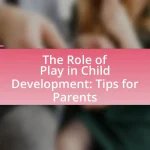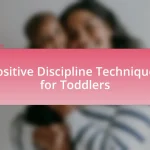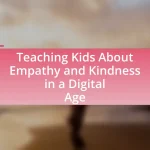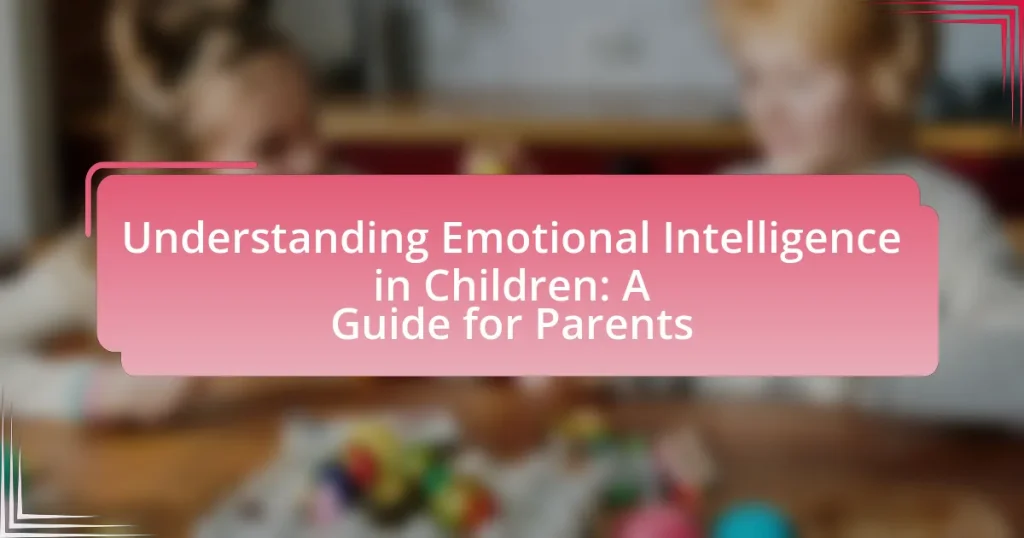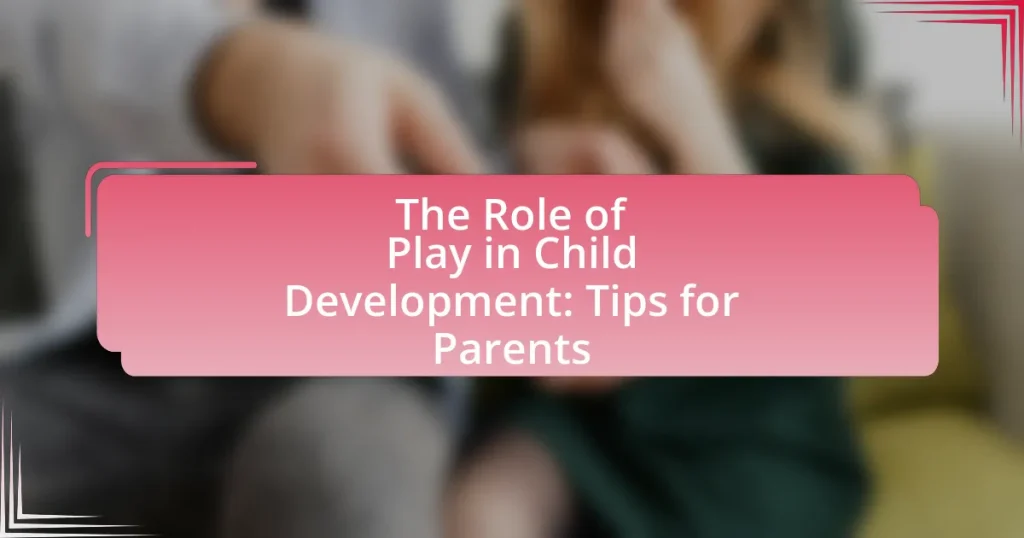Emotional intelligence in children is defined as the ability to recognize, understand, and manage their own emotions while empathizing with others. This article explores the significance of emotional intelligence in childhood, highlighting its key components such as self-awareness, self-regulation, social awareness, relationship management, and motivation. It discusses the differences between emotional intelligence and traditional intelligence, the impact of emotional intelligence on social skills and academic performance, and the signs of emotional intelligence in children. Additionally, the article provides practical strategies for parents to foster emotional intelligence, address challenges, and utilize community resources to support their child’s emotional development.
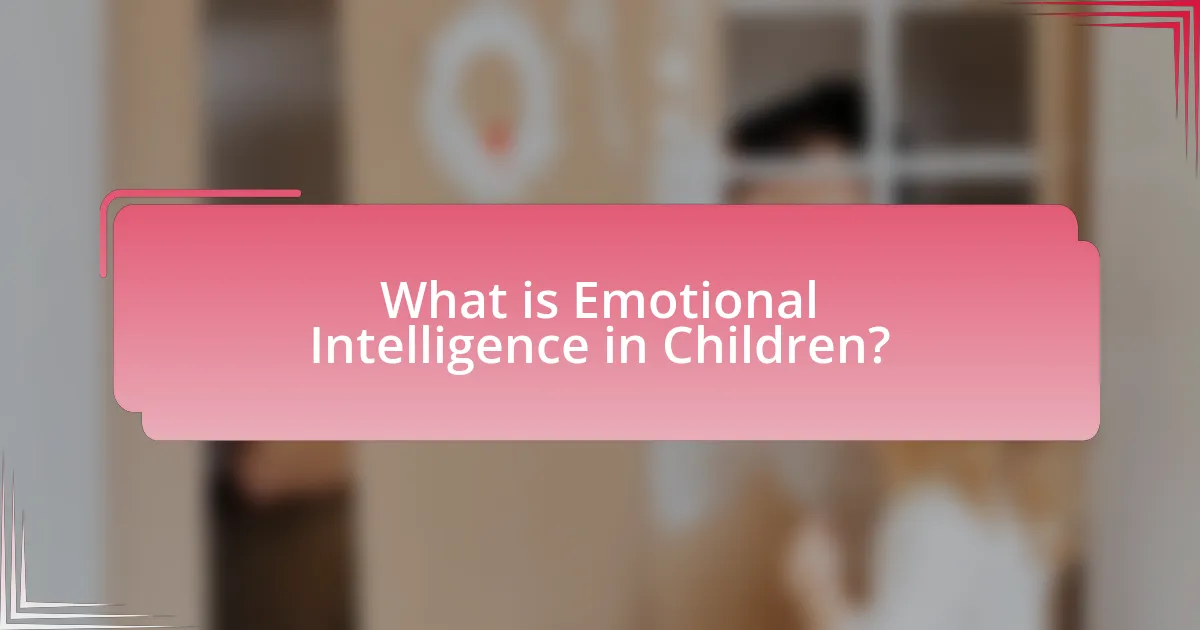
What is Emotional Intelligence in Children?
Emotional intelligence in children refers to the ability to recognize, understand, and manage their own emotions as well as the emotions of others. This skill is crucial for developing social competence, empathy, and effective communication. Research indicates that children with high emotional intelligence tend to perform better academically and have healthier relationships. For instance, a study published in the Journal of Educational Psychology found that emotional intelligence is a significant predictor of academic success, highlighting its importance in a child’s overall development.
How is Emotional Intelligence defined in the context of childhood?
Emotional Intelligence in the context of childhood is defined as the ability of children to recognize, understand, and manage their own emotions while also being able to empathize with the emotions of others. This definition encompasses skills such as emotional awareness, emotional regulation, and social skills, which are crucial for healthy interpersonal relationships and overall well-being. Research indicates that children with higher emotional intelligence tend to perform better academically and socially, as they can navigate social complexities more effectively and respond to challenges with resilience.
What are the key components of Emotional Intelligence in children?
The key components of Emotional Intelligence in children are self-awareness, self-regulation, social awareness, relationship management, and motivation. Self-awareness allows children to recognize their emotions and understand how they affect their behavior. Self-regulation helps them manage their emotions and impulses effectively. Social awareness enables children to empathize with others and understand social cues. Relationship management involves skills in communication and conflict resolution, fostering healthy interactions. Motivation drives children to pursue goals with a positive attitude and resilience. Research by Goleman (1995) emphasizes these components as essential for developing emotional intelligence, which is linked to better social skills and academic performance in children.
How does Emotional Intelligence differ from traditional intelligence?
Emotional Intelligence (EI) differs from traditional intelligence (IQ) primarily in its focus on emotional awareness and interpersonal skills rather than cognitive abilities. While traditional intelligence measures analytical and problem-solving skills through standardized tests, emotional intelligence encompasses the ability to recognize, understand, and manage one’s own emotions and the emotions of others. Research by Daniel Goleman highlights that EI contributes significantly to personal and professional success, suggesting that individuals with high emotional intelligence often excel in social interactions and leadership roles, which are not necessarily reflected in traditional IQ assessments.
Why is Emotional Intelligence important for children?
Emotional intelligence is important for children because it enhances their ability to understand and manage their own emotions, as well as empathize with others. This skill set is crucial for developing strong interpersonal relationships, which are foundational for social success and academic achievement. Research indicates that children with high emotional intelligence tend to perform better in school, exhibit fewer behavioral problems, and have improved mental health outcomes. For instance, a study published in the Journal of Educational Psychology found that students with higher emotional intelligence had better academic performance and were more likely to engage positively with peers and teachers.
What impact does Emotional Intelligence have on a child’s social skills?
Emotional Intelligence significantly enhances a child’s social skills by enabling them to understand and manage their own emotions while recognizing and influencing the emotions of others. Children with high Emotional Intelligence are better equipped to communicate effectively, empathize with peers, and resolve conflicts, which are essential components of strong social interactions. Research indicates that children with developed Emotional Intelligence demonstrate improved relationships and social competence, as evidenced by a study published in the Journal of Applied Developmental Psychology, which found that higher Emotional Intelligence correlates with better peer relationships and social adaptability.
How does Emotional Intelligence influence academic performance?
Emotional Intelligence significantly influences academic performance by enhancing students’ ability to manage emotions, foster relationships, and navigate social complexities. Research indicates that students with high emotional intelligence tend to exhibit better academic outcomes, as they can effectively cope with stress, engage in collaborative learning, and maintain motivation. A study published in the Journal of Educational Psychology found that students with higher emotional intelligence scores achieved better grades and had lower dropout rates, demonstrating a clear link between emotional skills and academic success.
What are the signs of Emotional Intelligence in children?
Signs of Emotional Intelligence in children include the ability to recognize and express their own emotions, empathize with others, and manage interpersonal relationships effectively. Children demonstrating emotional intelligence often show awareness of their feelings and can articulate them, such as saying they feel sad or happy. They also exhibit empathy by understanding and responding to the emotions of peers, often comforting others in distress. Furthermore, emotionally intelligent children can regulate their emotions, displaying patience and resilience in challenging situations. Research indicates that these skills contribute to better social interactions and academic performance, highlighting the importance of emotional intelligence in overall development.
How can parents identify emotionally intelligent behaviors in their children?
Parents can identify emotionally intelligent behaviors in their children by observing their ability to recognize and express emotions, empathize with others, and manage interpersonal relationships effectively. For instance, children who can articulate their feelings, such as saying “I feel sad” or “I am frustrated,” demonstrate emotional awareness. Additionally, children who show concern for others’ feelings, such as comforting a friend who is upset, exhibit empathy, a key component of emotional intelligence. Research indicates that children with high emotional intelligence tend to have better social skills and academic performance, as noted in a study published in the Journal of Educational Psychology, which found that emotional intelligence is linked to positive outcomes in both personal and academic domains.
What role do empathy and self-regulation play in a child’s Emotional Intelligence?
Empathy and self-regulation are crucial components of a child’s Emotional Intelligence, as they enable children to understand and manage their own emotions while also recognizing and responding to the emotions of others. Empathy allows children to connect with peers, fostering social relationships and enhancing communication skills, which are essential for emotional development. Self-regulation helps children control their emotional responses, leading to better decision-making and conflict resolution. Research indicates that children with higher levels of empathy and self-regulation tend to exhibit better social skills and academic performance, as demonstrated in studies by Denham et al. (2012) in the “Journal of Emotional Intelligence,” which found a strong correlation between these traits and overall emotional competence in children.
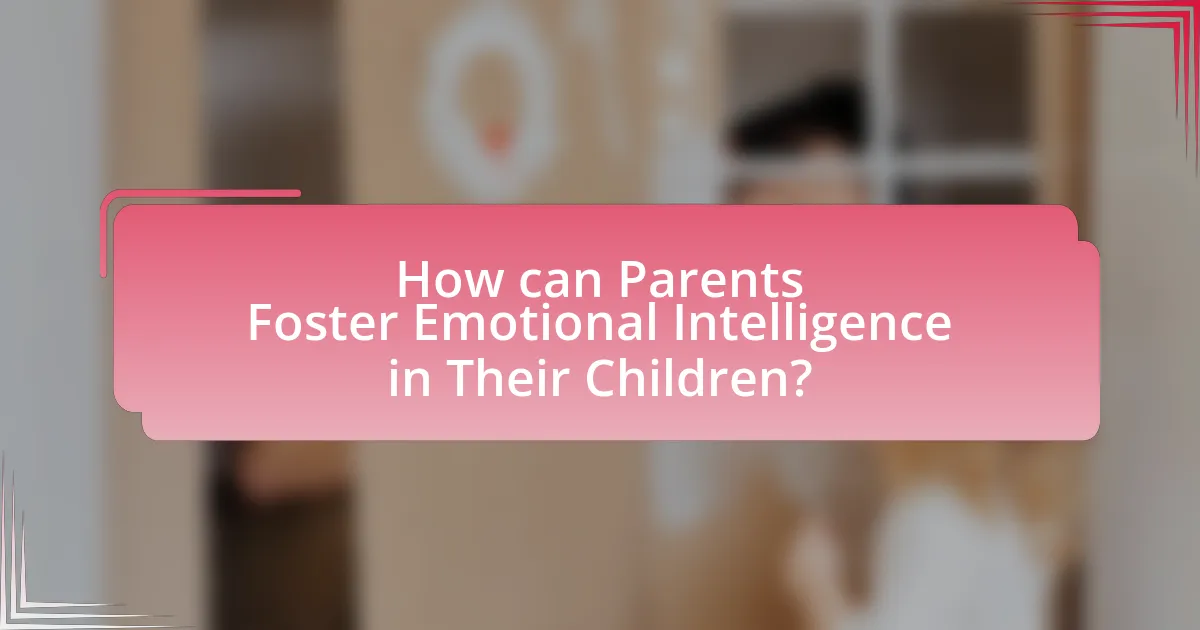
How can Parents Foster Emotional Intelligence in Their Children?
Parents can foster emotional intelligence in their children by modeling emotional awareness and regulation. When parents express their own emotions and discuss them openly, children learn to identify and understand feelings. Research indicates that children who observe their parents managing emotions effectively are more likely to develop similar skills, enhancing their emotional intelligence. Additionally, engaging in conversations about emotions, encouraging empathy through perspective-taking, and providing opportunities for social interactions can further support this development. Studies show that children who practice empathy and emotional communication tend to perform better academically and socially, highlighting the importance of these parental strategies.
What strategies can parents use to enhance their child’s Emotional Intelligence?
Parents can enhance their child’s Emotional Intelligence by modeling emotional awareness and regulation. By openly expressing their own emotions and discussing them, parents provide a framework for children to understand and articulate their feelings. Research indicates that children who observe their parents managing emotions effectively are more likely to develop similar skills, as demonstrated in studies by the University of California, which found a direct correlation between parental emotional expression and children’s emotional competence. Additionally, engaging children in conversations about emotions, encouraging empathy through role-playing, and teaching problem-solving skills in social situations further support the development of Emotional Intelligence.
How can parents model emotional awareness and regulation?
Parents can model emotional awareness and regulation by openly expressing their own emotions and discussing them with their children. This practice helps children recognize and label their feelings, fostering emotional intelligence. For instance, when a parent experiences frustration, they can articulate it by saying, “I feel frustrated because I can’t find my keys,” which demonstrates emotional awareness. Additionally, parents can demonstrate regulation by using coping strategies, such as taking deep breaths or counting to ten before responding to stress, showing children effective ways to manage their emotions. Research indicates that children who observe their parents effectively managing emotions are more likely to develop similar skills, as evidenced by studies highlighting the correlation between parental emotional expression and children’s emotional competence.
What activities can promote empathy and social skills in children?
Engaging in role-playing activities can promote empathy and social skills in children. Role-playing allows children to step into different characters’ shoes, fostering an understanding of diverse perspectives and emotions. Research indicates that children who participate in role-playing games demonstrate improved emotional recognition and social interactions, as they learn to navigate various social scenarios and respond appropriately to others’ feelings. Additionally, cooperative games that require teamwork and communication further enhance these skills by encouraging children to work together towards a common goal, thereby reinforcing the importance of collaboration and empathy in social settings.
How can communication improve a child’s Emotional Intelligence?
Effective communication enhances a child’s Emotional Intelligence by fostering self-awareness and empathy. When children engage in open dialogues, they learn to express their feelings and recognize emotions in themselves and others. Research indicates that children who participate in discussions about emotions demonstrate improved emotional regulation and social skills. For instance, a study published in the journal “Child Development” by Denham et al. (2012) found that children who received training in emotional communication showed significant gains in their ability to understand and manage emotions. This evidence supports the notion that communication is a critical tool in developing a child’s Emotional Intelligence.
What techniques can parents use to encourage open discussions about feelings?
Parents can encourage open discussions about feelings by creating a safe and non-judgmental environment for their children. This can be achieved through active listening, where parents attentively listen to their child’s feelings without interrupting or dismissing them. Additionally, parents can model emotional expression by sharing their own feelings, which demonstrates that discussing emotions is normal and acceptable. Engaging in regular family meetings or check-ins can also provide structured opportunities for children to express their feelings. Research indicates that children who feel safe to express their emotions are more likely to develop strong emotional intelligence, as supported by studies from the American Psychological Association, which highlight the importance of open communication in emotional development.
How does active listening contribute to a child’s emotional development?
Active listening significantly contributes to a child’s emotional development by fostering a sense of security and validation. When caregivers engage in active listening, they demonstrate that the child’s thoughts and feelings are important, which enhances the child’s self-esteem and emotional intelligence. Research indicates that children who experience active listening are more likely to develop empathy and better emotional regulation skills, as they learn to articulate their own emotions and understand those of others. For instance, a study published in the Journal of Child Psychology and Psychiatry found that children who felt heard and understood were more adept at managing their emotions and forming healthy relationships.
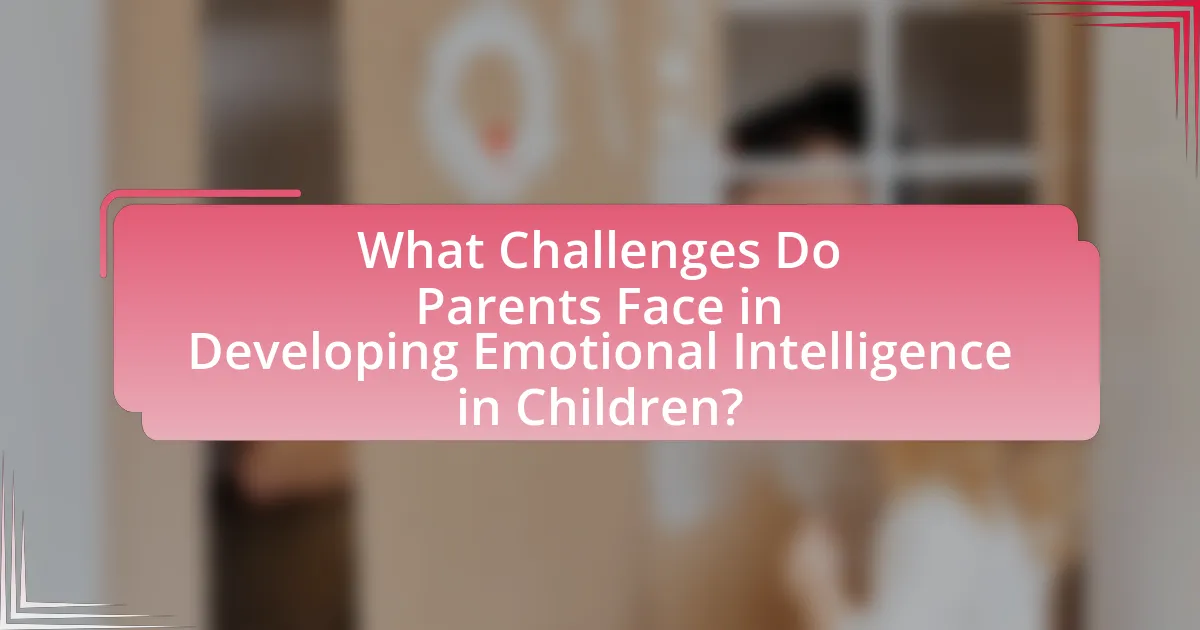
What Challenges Do Parents Face in Developing Emotional Intelligence in Children?
Parents face several challenges in developing emotional intelligence in children, including a lack of understanding of emotional intelligence concepts, inconsistent modeling of emotional behaviors, and external societal pressures. Many parents may not fully grasp what emotional intelligence entails, which can hinder their ability to teach these skills effectively. Additionally, if parents do not consistently demonstrate emotional regulation and empathy in their own behaviors, children may struggle to learn these essential skills. Furthermore, societal influences, such as peer pressure and cultural norms, can complicate the emotional development process, making it difficult for parents to create an environment conducive to emotional growth. These challenges highlight the complexities involved in fostering emotional intelligence in children.
What common obstacles might parents encounter?
Parents commonly encounter obstacles such as lack of time, difficulty in communication, and emotional stress. These challenges can hinder their ability to effectively nurture emotional intelligence in their children. For instance, busy schedules often limit parents’ availability for meaningful interactions, which are crucial for developing emotional skills. Additionally, parents may struggle to communicate their own emotions or understand their children’s feelings, leading to misunderstandings. Emotional stress, stemming from various life pressures, can further impact parents’ patience and responsiveness, making it harder to foster a supportive environment for emotional growth.
How can parents address their own emotional challenges to support their children?
Parents can address their own emotional challenges by engaging in self-reflection and seeking professional support, which enables them to model healthy emotional regulation for their children. Self-reflection allows parents to identify their emotional triggers and patterns, fostering greater self-awareness. Seeking professional support, such as therapy or counseling, provides parents with tools to manage their emotions effectively. Research indicates that parents who actively work on their emotional health can positively influence their children’s emotional intelligence, as children often learn by observing their parents’ behaviors and coping strategies.
What external factors can hinder a child’s Emotional Intelligence development?
External factors that can hinder a child’s Emotional Intelligence development include family dynamics, socioeconomic status, and educational environment. Family dynamics, such as high conflict or lack of emotional support, can negatively impact a child’s ability to understand and manage emotions. Socioeconomic status affects access to resources and opportunities for social interaction, which are crucial for developing emotional skills. Additionally, an educational environment that lacks emotional learning programs or supportive teachers can limit a child’s exposure to emotional intelligence training. Research indicates that children from supportive family backgrounds and enriched educational settings tend to exhibit higher emotional intelligence, highlighting the importance of these external factors.
How can parents overcome these challenges?
Parents can overcome challenges in fostering emotional intelligence by actively engaging in open communication and modeling emotional awareness. By discussing feelings openly, parents create an environment where children feel safe to express their emotions. Research indicates that children who experience supportive communication are more likely to develop strong emotional regulation skills. Additionally, parents can utilize techniques such as role-playing and storytelling to teach empathy and problem-solving, which are crucial components of emotional intelligence. Studies show that children exposed to these methods demonstrate improved social skills and emotional understanding, reinforcing the effectiveness of these strategies.
What resources are available for parents seeking guidance on Emotional Intelligence?
Parents seeking guidance on Emotional Intelligence can access various resources, including books, online courses, and workshops. Notable books such as “Emotional Intelligence 2.0” by Travis Bradberry and Jean Greaves provide practical strategies for developing emotional skills in children. Online platforms like Coursera and Udemy offer courses specifically focused on Emotional Intelligence, often designed by experts in psychology and education. Additionally, organizations such as the Collaborative for Academic, Social, and Emotional Learning (CASEL) provide valuable materials and frameworks for parents to understand and foster Emotional Intelligence in their children. These resources are backed by research indicating that Emotional Intelligence significantly contributes to children’s social and academic success.
How can community support enhance a child’s emotional development?
Community support enhances a child’s emotional development by providing a network of relationships that foster emotional security and resilience. When children engage with supportive adults and peers in their community, they learn to express their feelings, develop empathy, and build social skills. Research indicates that children who experience strong community ties are more likely to exhibit positive emotional outcomes, such as lower levels of anxiety and depression. For instance, a study published in the Journal of Community Psychology found that children with access to community resources, such as mentoring programs and after-school activities, showed significant improvements in emotional regulation and social competence. This evidence underscores the critical role that community support plays in nurturing a child’s emotional growth.
What practical tips can parents implement to nurture Emotional Intelligence?
Parents can nurture Emotional Intelligence in their children by actively modeling emotional awareness and regulation. This involves openly discussing feelings, both positive and negative, to help children identify and articulate their emotions. Research indicates that children who engage in conversations about emotions develop better emotional understanding and empathy. Additionally, parents can encourage problem-solving skills by guiding children through conflicts and helping them consider different perspectives. Studies show that children who practice empathy and perspective-taking are more likely to exhibit higher emotional intelligence. Finally, creating a safe environment where children feel comfortable expressing their emotions fosters resilience and emotional growth, as supported by findings from the Collaborative for Academic, Social, and Emotional Learning (CASEL).
How can daily routines be structured to promote emotional learning?
Daily routines can be structured to promote emotional learning by incorporating specific activities that foster emotional awareness and regulation. For instance, parents can include daily check-ins where children express their feelings, helping them identify and articulate emotions. Research indicates that regular emotional discussions enhance children’s emotional vocabulary and understanding, which is crucial for emotional intelligence development. Additionally, integrating mindfulness practices, such as deep breathing or meditation, into the daily routine can help children learn to manage their emotions effectively. Studies show that mindfulness can improve emotional regulation and reduce anxiety in children, further supporting emotional learning.
What role do books and stories play in teaching Emotional Intelligence?
Books and stories play a crucial role in teaching Emotional Intelligence by providing relatable scenarios that help children understand and manage their emotions. Through narratives, children can observe characters experiencing various emotional situations, which fosters empathy and emotional awareness. Research indicates that storytelling enhances emotional literacy; for instance, a study published in the Journal of Educational Psychology found that children who engaged with emotionally rich stories demonstrated improved emotional understanding and regulation skills. This engagement with characters’ feelings allows children to reflect on their own emotions and develop social skills, making books and stories effective tools for nurturing Emotional Intelligence.

